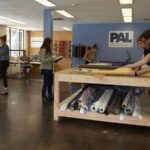 Known as McCall Pattern Company’s “fit expert,” Pati Palmer is a top-selling pattern designer and sewing industry leader.
Known as McCall Pattern Company’s “fit expert,” Pati Palmer is a top-selling pattern designer and sewing industry leader.
 |
Pati Palmer, a top-selling pattern designer and sewing industry leader.OREGON BUSINESS PHOTO |
When Pati Palmer went to Oregon State University in the early 1960s to study home economics it was the cusp of the women’s revolution. Soon the cool girls would have little to do with sewing and the domestic arts as their generation left the home and moved full force into the workplace.
As that revolution rolled on, Palmer set about making her career in sewing and building over the next four decades a mini empire. She and partner Susan Pletsch started Palmer/Pletsch Inc. in 1974, designing first for Vogue Patterns and then in 1980 switching to the McCall Pattern Company. There they created what would become the best-selling pattern in McCall’s history. Tapping into all those cool girls who were now working women and needed a uniform, they designed a pattern for an easy-to-make blazer that sold 1 million copies in one year.
In 1985, the partners started the Palmer/Pletsch School of Sewing in southeast Portland to teach sewing and train teachers. Pletsch left the company in 1986 and Palmer went on to build her business, which now includes the school, book publishing, pattern design, traveling seminars and sewing workshops. Known as McCall’s “fit expert,” she remains its top-selling designer. Her sewing books (she is the author of 10, editor/publisher of 23) have sold more than 3 million copies. She also produces how-to DVDs and is the creator of eight sewing accessories. She recently was inducted into the American Sewing Guild’s Sewers Hall of Fame.
At its peak, her company and her late husband’s Italian ceramics import business, La Vita Vera/Mamma Ro, grossed about $2.5 million. But the retail expansion of the Mamma Ro stores went bust (one store is still open on NW 23rd Street in Portland), and Palmer/Pletsch took a hit as fabric chains began to fade in the early 1990s. Now revenue is about half of that peak, and Palmer’s staff for both companies is small — herself and three others. They are a soup-to-nuts operation, doing everything from shooting their own video for the DVDs to taking photos for the books, to doing their own boxing and shipping. Whatever it takes.
Palmer has an impressive sewing room that spans the third floor of her elegant home in the West Hills of Portland. Equally elegant in her trim blondeness, the 63-year-old industry leader has always lived in Oregon, unusual because New York is the center of her industry and the home of McCall’s. But her guiding principle has been fashion for real people and real bodies, not Manhattan X-rays. “The advantage of me being here and designing for McCall’s in New York is that I know what’s going on,” she says. “When you are with real people, that’s how you see things.”
Palmer is very real. An instant girlfriend, she is genuine and passionate about where her industry is headed, despite the ups and downs. She’s stitched together the ceramics and publishing parts of her operation with the publication of a new cookbook, The Food Nanny Rescues Dinner by Liz Edmunds, which features the Mamma Ro products. “These two companies are very compatible,” she says. “They are going in the same place.” That place is focused on web sales for both companies, leaving behind the fickle brick and mortar.
Palmer is gratified to see interest in home sewing growing again. She says it began to pick up about five years ago with quilting leading the way, and the recent recession has also boosted the industry. Then there’s the Project Runway effect, a reality TV show that debuted in 2004 and shows no signs of fading. Each season, young and bright-eyed contestants compete with each other to create the best fashion designs with hopes of getting launched as a designer. “The fashion schools are full of 20-somethings sewing now,” Palmer says.
Younger women have so enthusiastically embraced the ancient domestic art that sewing lounges are sprouting up around town, like Seam Divas in Vancouver, Wash., a place that offers warm support and a hot cup of coffee along with learning the craft.
Welcome back, cool girls.


